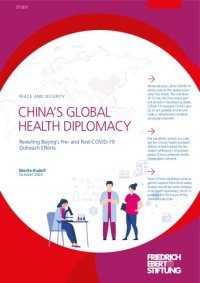
Ebook: CHINA’S GLOBAL HEALTH DIPLOMACY : Revisiting Beijing’s Pre- and Post-COVID-19 Outreach Efforts
Author: Moritz Rudolf
- Genre: Other Social Sciences // Politics: International Relations
- Year: 2022
- Publisher: Friedrich-Ebert-Stiftung
- City: Bonn
- Language: English
- pdf
pushes the global economy into chaos,
the ‘China, the first responder’ narrative
will persist in developing states. The pandemic
revealed China’s global capabilities.
Geostrategic considerations guided China’s
donations, with key BRI countries receiving
the lion’s share. The pandemic also
highlighted the party-state’s ability to promote
a streamlined global narrative via
digital channels. China has established a
parallel COVID-19 information bubble targeting
developing states, in which China is
the responsible major power, and the
West is in decline. China’s COVID-19 diplomacy
failed in the West and Southeast
Asia but succeeded in the Middle East and
Africa. Political elites from third states welcomed
Beijing’s health aid, often endorsing
policy positions of the PRC at the UN
level.
COVID-19 served as a catalyst for Beijing’s
health outreach efforts. Chinese provinces
have been cultivating close relationships
with individual countries for decades
by sending medical teams. After SARSCoV-
1 (2002–2004), which challenged
China’s economic and political stability,
the PRC stepped up its international health
cooperation efforts. The 2015 launch of
the Health Silk Road marked the beginning
of China’s more strategic and centralized
health diplomacy. The pandemic fasttracked
the formation of Beijing’s envisioned
global (China-centered) health cooperation
network.
Despite the PRC’s quixotical Zero-COVID-19
policy, decision-makers should recognize
the long-term effects of Chinese aid.
Taking China’s ambitions in the global
competition over the support from third
(developing) states into account, Europe
should be more strategic in its health diplomacy.
Health diplomacy is essential to
the future of the international order. Decision-
makers should invest in social media
outreach efforts in recipient states, map
their interests, and utilize (non-essential)
health aid as a political bargaining chip.
Europe should focus on countries with
whom health cooperation has already developed,
or which are of key strategic interest
for both Europe and China. Regional
EU+x formats should be built. At the
multilateral level, Europe needs to anticipate
and match China’s increasing level of
engagement.
the ‘China, the first responder’ narrative
will persist in developing states. The pandemic
revealed China’s global capabilities.
Geostrategic considerations guided China’s
donations, with key BRI countries receiving
the lion’s share. The pandemic also
highlighted the party-state’s ability to promote
a streamlined global narrative via
digital channels. China has established a
parallel COVID-19 information bubble targeting
developing states, in which China is
the responsible major power, and the
West is in decline. China’s COVID-19 diplomacy
failed in the West and Southeast
Asia but succeeded in the Middle East and
Africa. Political elites from third states welcomed
Beijing’s health aid, often endorsing
policy positions of the PRC at the UN
level.
COVID-19 served as a catalyst for Beijing’s
health outreach efforts. Chinese provinces
have been cultivating close relationships
with individual countries for decades
by sending medical teams. After SARSCoV-
1 (2002–2004), which challenged
China’s economic and political stability,
the PRC stepped up its international health
cooperation efforts. The 2015 launch of
the Health Silk Road marked the beginning
of China’s more strategic and centralized
health diplomacy. The pandemic fasttracked
the formation of Beijing’s envisioned
global (China-centered) health cooperation
network.
Despite the PRC’s quixotical Zero-COVID-19
policy, decision-makers should recognize
the long-term effects of Chinese aid.
Taking China’s ambitions in the global
competition over the support from third
(developing) states into account, Europe
should be more strategic in its health diplomacy.
Health diplomacy is essential to
the future of the international order. Decision-
makers should invest in social media
outreach efforts in recipient states, map
their interests, and utilize (non-essential)
health aid as a political bargaining chip.
Europe should focus on countries with
whom health cooperation has already developed,
or which are of key strategic interest
for both Europe and China. Regional
EU+x formats should be built. At the
multilateral level, Europe needs to anticipate
and match China’s increasing level of
engagement.
Download the book CHINA’S GLOBAL HEALTH DIPLOMACY : Revisiting Beijing’s Pre- and Post-COVID-19 Outreach Efforts for free or read online
Continue reading on any device:

Last viewed books
Related books
{related-news}
Comments (0)